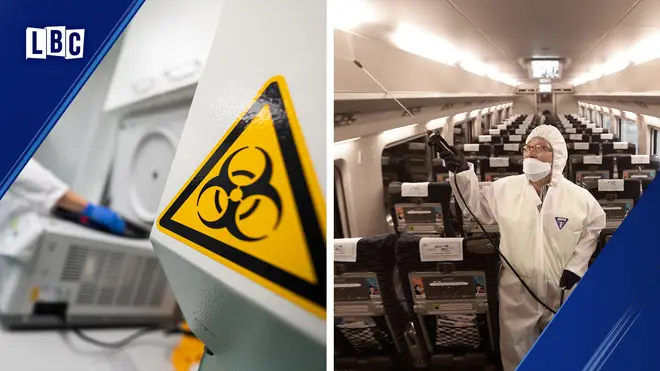
Shelagh Fogarty 1pm - 4pm
24 January 2020, 10:21 | Updated: 24 February 2020, 20:55
After four people died in Italy after contracting coronavirus, this is what you need to do to avoid catching the Chinese superbug.
The country is dealing with Europe's first major outbreak of the Covid-19 illness, with more than 150 cases. Several towns have been sealed off. Last night neighbouring Austria stopped all trains crossing the border for several hours because of two suspected cases, which turned out to be a false alarm.
13 people in the UK have been held in quarantine after catching the disease.
So with fears of an outbreak in the UK, this is what you need to do to reduce the chances of catching the virus.
Coronavirus: Do facemasks protect you from the virus?
Coronavirus is transmitted in the same way as seasonal flu. It's what we call droplet infection. It's the old saying of coughs and sneezes spread diseases and can be transferred person-to-person
However, Nick Ferrari spoke to Professor John Oxford, Emeritus Professor of Virology at the Queen Mary College, and he played down the concerns it would spread quickly. He told LBC: "The Chinese authorities say you can catch it person to person.
"But no virus in that coronavirus family is anything like influenza as regards infectivity. You'd have to get pretty close to somebody to catch it - probably living with someone. It's not the sort of virus you'll catch by walking past someone on the street."

People need to reinvoke the slogan "Catch it, bin it, kill it, wash your hands". That is the simple answer because it's a respiratory illness.
You should treat it in the same way you treat a cold: use alcohol-based anti-bacterial soaps and sprays, avoid touching their eyes, nose and mouth and avoid contact with people who are infected.
Professor Oxford says the old-fashioned way of stopping viruses is the best defence here: "The only way to stop it is physical cleaning and social distance - keeping away from people. Once they are close together in taxis or small rooms, then there may be a problem."
The disease started in Wuhan, China and most of the people who have contracted the disease around the world have either travelled from China or been in close contact with someone who has.
If you think you may have coronavirus, please don't come down to your surgery or A&E and please don't get on public transport.
Stay at home and ring 111. They will triage you from there and if you need help, then help will come to you.
The advice that's gone out to Primary Care and GPs is to get a travel history to see what type of people they have come into contact with.
The symptoms are similar to a common cold, including:
- a runny nose
- headache
- cough
- fever
- shortness of breath
- chills
- body aches
In most cases, you won't know whether you have a Coronavirus or a different cold-causing virus, such as rhinovirus.
But if a Coronavirus infection spreads to the lower respiratory tract, such as your lungs, it can cause pneumonia, especially in older people.